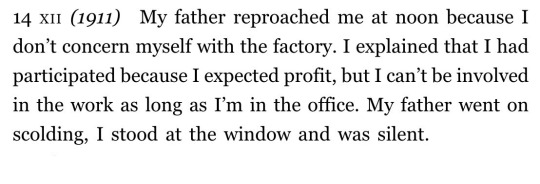#kafkas asbestos factory
Explore tagged Tumblr posts
Text



@kuminemo, me and franz kafka's asbestos factory
11 notes
·
View notes
Text
Note: On July 31, 1914 Germany declared war on Russia and announced general mobilization. Karl Hermann and Josef (Pepa) Pollak, the husbands of Kafka’s two sisters were conscripted but the AUVA had declared Kafka "indispensable." Because he stayed in Prague as a "recruit for unarmed service," after the conscription of his brother-in-law Karl Hermann, he had to devote increased attention to the asbestos factory. Shortly thereafter Karl Herman's brothers Rudolf and Paul took on management responsibilities. Elli Hermann, Kafka's sister, moved into their parents' apartment with her children Felix and Gerti, while Kafka at first moved into his sister Valli's apartment (Bilekgasse 10); Valli had gone to stay with her parents-in-law in Böhmisch-Brod after her husband's conscription.

— July 31, 1914 / Franz Kafka diaries
287 notes
·
View notes
Text
Here's your REAL checklist for being like franz kafka:
- worked in asbestos factory (as a partner, not factory worker)
- vegetarian
- enjoyer of alternative medicine and Monterossi schooling
- tried to join the army but was rejected due to having tuberculosis
- kind of misogynistic
8 notes
·
View notes
Text
On 5 November 1915, in Prague, Dr Franz Kafka, a deeply educated lawyer, a fast-track highflyer in the service of his state, co-owner of an asbestos factory and newly announced winner of Berlin’s biggest literary prize, concluded that the Germanic victory he desired was now certain. He therefore rationally and freely chose to enhance his future wealth by putting about £30,000 in today’s money into a rock-solid vehicle: Austrian 5.5 per cent fifteen-year bonds. It was not a prophetic call: three years later, the Habsburg Empire defaulted on its centuries-old sovereign debt by the simple, if drastic, method of ceasing to exist.
46 notes
·
View notes
Text
“-As someone who has lived in a sort of intimacy with Kafka for several years now, I’m curious to know what are some of your favorite moments from his life, and if you could name one or two textual moments in Kafka’s writings that stand out for you.
-Off the top of my head, I’d say that the moments in his life I most enjoy recalling are the ones that bring a smile to my lips, or a belly laugh to my—well, belly. I marvel at Kafka’s parents’ decision to give Franz a healthy start in his professional life by setting up an asbestos factory for him to run. I picture him arriving at a Christian fundamentalist nudist colony and refusing (initially) to part with his swim trunks. I see him getting a coveted promotion at work and responding with a roar of laughter instead of the expected somber expression of gratitude. I watch him getting engaged and disengaged, several times, at the drop of the proverbial hat, most startlingly while courting Felice Bauer, a woman whose looks (her teeth in particular) are repulsive to him. I laugh every time I see him, in my mind’s eye, “Fletcherizing” his food while his father cringes behind a newspaper so as not to witness this act.
I also find instances of hilarity throughout his writings, such as in the story fragment about the Olympic swimmer who cannot swim. My funny bone is also tickled by numerous episodes in all three of Kafka’s (unfinished) novels: Josef K.’s visit to the painter Titorelli in The Trial, Karl Rossmann’s time with Brunelda in The Man Who Disappeared, and K.’s encounters with a whole host of kooky characters in The Castle. One of my favorite short stories is “Report to an Academy,” narrated by an ape who’s been forced to become human to gain some degree of freedom. Here we learn an intriguing set of elements (spitting, getting drunk . . .) that are said to constitute humanness, and hence freedom.
I could go on and on, but I’ll end this question simply by quoting in full my favorite Kafka parable, the spare prose of which says it all:
Give Up It was very early in the morning, the streets clean and empty, I was walking to the station. When I compared the tower clock with my watch I realized that it was already much later than I had thought, I had to hurry, the shock of this discovery made me unsure of the way, I did not yet know my way very well in this town; luckily, a policeman was nearby, I ran up to him and breathlessly asked him the way. He smiled and said: “You want to know the way from me?” “Yes,” I said, “since I cannot find it myself.” “Give up! Give up,” he said, and turned away with a big sweep, like people who want to be alone with their laughter.” -Shelley Frisch, in a conversation
6 notes
·
View notes
Text
Note in the diaries: The asbestos factory, in which Hermann Kafka also had a financial stake, increasingly became a point of contention between father and son in the period that followed. Apparently in connection with this confrontation, Kafka noted on his notepad: My hatred of my father.

— December 14, 1911 / Franz Kafka diaries
206 notes
·
View notes
Text
day 5


franz kafka's asbestos factory


day 6






you know whats back??? me in places that huntik happened, this time there will be prague shitpost till thursday
also face reveal??? (photo of me with a golem by @kuminemo)



49 notes
·
View notes